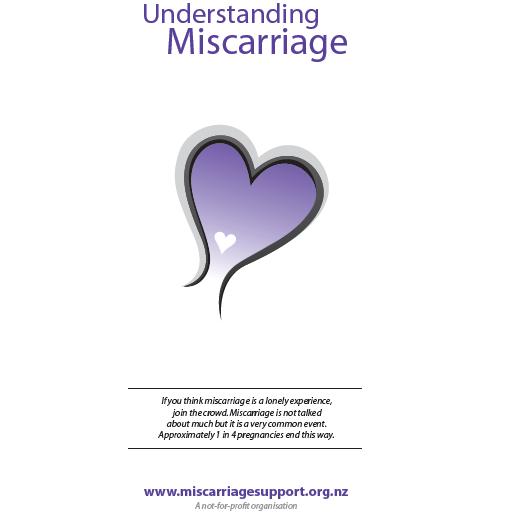If you're a frequent visitor to Healthify, why not share our site with a friend? Don't forget you can also browse Healthify without using your phone data.
Miscarriage | Whakatahe
Key points about miscarriage
- A miscarriage (whakatahe) is the loss of a pregnancy before 20 weeks.
- The loss of a baby after 20 weeks is known as a stillbirth.
- If you're pregnant and have vaginal bleeding or abdominal pain, contact your lead maternity carer (LMC) midwife or doctor.
- Light vaginal bleeding is relatively common early in pregnancy and doesn't necessarily mean you're having a miscarriage, but all bleeding should be checked.
- It's normal to experience grief after a miscarriage and to need time to recover from the emotional and physical impact of pregnancy loss.

Miscarriage is a pregnancy that ends on its own before 20 weeks gestation. The loss of a baby after 20 weeks is known as a stillbirth.
Two in every 10 pregnancies end in miscarriage. Most miscarriages (more than 95%) occur in the first 12 to 14 weeks of pregnancy (the first trimester). If you have a very early miscarriage, you may not even be aware that you were pregnant.
Usually no cause for the miscarriage is found.

Image credit: 123rf
The following medical terms are used to describe the different types of miscarriage:
- Complete miscarriage – this is when all the pregnancy tissue in your womb is passed naturally. This means you probably won’t need any further treatment, but vaginal bleeding will continue for a while, similar to having a period.
- Incomplete miscarriage – this is when you pass some of the pregnancy tissue but some remains in your womb. You may experience pain and bleeding.
- Missed miscarriage – this is when the pregnancy has stopped growing and there is no heartbeat. You may experience light bleeding or there may be no symptoms. An ultrasound scan shows that the pregnancy tissue remains in your womb.
Miscarriage is usually a natural process. Most miscarriages take place because something happened early in the pregnancy so a healthy baby/pēpi can’t grow. This could be related to a problem with cell development as the baby forms, the health of the mother, infection, or issues with the development of the placenta.
Usually there is nothing that could have been done to stop the miscarriage from happening.
First trimester miscarriages are often caused by problems with the baby’s chromosomes (genetic material). Miscarriages are more likely as you get older (over 35 years of age) because eggs tend to have more chromosomal abnormalities as you age.
Signs of miscarriage depend on the stage of your pregnancy. During the first few weeks of pregnancy, you may have some spotting or light vaginal bleeding. You might not even know you were pregnant. Miscarriage that occurs later often includes painful cramps and bleeding.
Sign that might indicate a miscarriage include:
- vaginal bleeding, which varies from light spotting to heavy bleeding
- fluid, blood clots or tissue passing from your vagina
- tummy pain or cramping
- lower back pain
- fever and chills (this may indicate infection).
If you know you’re pregnant, speak to your lead maternity carer (LMC) midwife or doctor if you have any bleeding from your vagina, or if you think you may be having or have had a miscarriage.
If you are experiencing light bleeding and pain that can be managed with paracetamol, then you can call your doctor or midwife during ‘daylight hours’. If you are soaking a pad every 30 minutes for more than 2 hours, or you have severe pain, you should contact your LMC midwife, see a doctor or call an ambulance.
Many pregnant people experience light vaginal bleeding during the first trimester. Not all bleeding means you're having a miscarriage, but all bleeding should be checked.
If you're concerned that you may be starting to miscarry or you're having any vaginal bleeding and/or pain contact your LMC midwife or seek medical advice from your healthcare provider or an urgent care clinic. They will tell you what to do. If the bleeding is light and the pain is manageable with paracetamol you can wait until 'working hours' to contact a doctor or midwife. If you're not sure you could call Healthline (0800 611 116) for advice.
It's safe to take paracetamol in pregnancy. Non steroidal anti inflammatory medications such as ibuprofen or voltaren should not be taken in an ongoing pregnancy. Therefore, you shouldn't take these if you haven't been diagnosed with a miscarriage.
If you’re pregnant and experiencing vaginal bleeding, your LMC midwife or doctor will probably organise an ultrasound to check if your pregnancy is ongoing or you are having a miscarriage. An ultrasound can help see whether:
- there’s a fetal heartbeat
- the fetus/baby is growing as expected
- the pregnancy is ectopic (occurring outside your uterus, such as in 1 of your fallopian tubes).
Sometimes, in early pregnancy, it's too soon to tell whether the pregnancy is ongoing or not. In this situation you may need to have follow up blood tests or a scan.
Unfortunately, your healthcare provider can’t stop you from miscarrying.
Go to the emergency department at the local hospital if:
- you feel dizzy or light-headed
- your bleeding is heavy (soaking one or more pads in an hour or less for more than 2 hours) and/or if you’re passing blood clots and/or having pain that can't be managed by paracetamol
- you feel cold, shivery or unwell, or you think you have a high temperature.
If you’re alone and things are happening fast, dial 111 and ask for an ambulance. Never drive yourself to hospital if you have heavy bleeding or bad pain.
An ultrasound scan is the most accurate way of confirming a miscarriage. It will also show whether there is any pregnancy tissue remaining in your uterus (womb). Sometimes in early pregnancy it's not clear from the ultrasound whether the pregnancy is ongoing or it's a miscarriage. In this situation you may need to have a follow up scan in 1 to 2 weeks (to see if the pregnancy is growing) or follow up blood tests.
You may also be asked to take a pregnancy test (by a urine or blood sample) but remember that it can take time for the hormones in your body to return to normal after a miscarriage. This means you may feel pregnant and your pregnancy test may still be positive for a while.
If your blood group is Rhesus negative, you may need an Anti D injection. Talk to your doctor or midwife about this. Read more about blood groups and pregnancy.
The type of treatment you need will depend on how far along your pregnancy was, whether you can pass all the pregnancy tissue and whether you have any complications.
Complete miscarriage
If the miscarriage is complete and all pregnancy tissue has been cleared naturally by your body, no further treatment is needed.
The earlier you are in your pregnancy, the more likely it is that your body will clear all the pregnancy tissue from your uterus by itself and you won’t need further treatment.
Incomplete or missed miscarriage
Treatment options for incomplete or missed miscarriage can be conservative, medical or surgical. All of the options have advantages and disadvantages. Unless you're bleeding heavily, there's no rush to make a decision. Talk to your healthcare provider about which treatment is best and safest for you.
Conservative management (also known as expectant management)
This is a where you wait for nature to take its course and clear the pregnancy tissue from your body naturally. This could take days or weeks and you may need follow up for monitoring of your pregnancy hormone levels. If your womb doesn’t empty completely you may need further treatment.
Advantages:
- It's a natural process, allowing nature to take its course.
- No drugs, anaesthesia or operation are required.
Disadvantages:
- It's not possible to predict how long it will take for the miscarriage to be completed – it can take days or weeks to occur and the course of pain and bleeding is unpredictable.
- There is a chance that your womb won't empty completely and you may need to have medical or surgical management.
Medical management
Medical management involves the use of medicines (mifepristone and misoprostol) to speed up the natural process of miscarriage. Mifepristone prepares your uterus for the effects of misoprostol and the misoprostol stimulates your womb to contract and empty itself. You may not need mifepristone.
Most people experience moderate abdominal pain and heavy vaginal bleeding when they take misoprostol. Sometimes bleeding begins straight away, but it can take 2 to 3 days or longer. You’ll be given the medicine in hospital then you can go home, as long as you have an adult support person with you. You may need to take another dose of the medicine the next day and have a blood test 2 weeks later to check your pregnancy hormone levels.
Advantages:
- No surgery or anaesthetic required.
- You don’t need to stay in hospital.
- It can be started the same day as your appointment.
Disadvantages:
- You usually need to be seen in hospital for an appointment.
- Medical management isn't always successful and you may still need to have further doses of misoprostol or surgical management.
- These medications may not be suitable for you, eg, if you have some heart conditions.
- Side effects are uncommon but include nausea (feeling sick), vomiting (being sick) and diarrhoea (runny poo).
What can I expect with conservative or medical management?
- When the miscarriage is about to happen, you can expect very heavy bleeding for at least a couple of hours and you’ll pass some pregnancy tissue and clots. Within a few hours the bleeding will become similar to the heaviest day of your menstrual period, and after that you’ll have light bleeding which should settle over several days. The amount of time before the bleeding stops varies from person to person.
- The process of emptying your uterus can be painful – you can take pain relief such as paracetamol or ibuprofen to help with this. The pain should only last a few hours. You can also use wheat bags or a hot water bottle to help with the pain.
- Sometimes you may see the fetus in the pregnancy tissue that’s passed. This can be upsetting, but you may find it helpful to see what’s happened. You’ll be given a small container for the pregnancy tissue so that you can bring it into the hospital so that it can be sent to the laboratory (if you wish) to confirm that it is pregnancy tissue.
- You should see your healthcare provider within 2 weeks so that they can check whether you still have symptoms, such as bleeding, pain or discharge. This is also a time when you can discuss how you’re feeling – you may want to consider counselling to help you through this experience. You can also talk about contraception or plans for a future pregnancy.
- You should do a pregnancy test after 3 weeks to confirm that the all the pregnancy tissue has been removed. Contact your healthcare provider if the pregnancy test is still positive at this stage.
Go to the hospital emergency department if you have:
|
You can choose to have the tissue that you pass, or that’s removed during surgery, tested to confirm that it is pregnancy tissue. The tissue can then be returned to you. Some people may wish to bury the pregnancy tissue in a special place, eg, under a tree at home.

Image credit: Depositphotos
A miscarriage can be a difficult time. Give yourself time to recover physically and to come to terms with what has happened emotionally.
Here are some things you can do to take care of yourself if you've had a miscarriage:
- Rest as much as you can, especially in the first few days after the miscarriage.
- Reach out and talk to someone you trust. It’s normal to feel grief if you lose a baby, even if it happens early in a pregnancy. You may feel this way immediately after the miscarriage, or after several weeks. You may also feel anger, guilt or anxiety. See our page on organisations providing miscarriage support.
- Avoid swimming and spa pools for 10 to 14 days and shower instead of bathing.
- Use sanitary pads instead of tampons until your next period to reduce the risk of infection.
- Avoid sex while you're still bleeding – this reduces the risk of infection. If the miscarriage is complete, you can expect the bleeding to get lighter and lighter and stop in about 1 week, but this varies from person to person.
- Tell your healthcare provider immediately if you experience fever and chills, pain or if you have a smelly vaginal discharge or bleeding – you may have an infection that needs treatment.
Apps reviewed by Healthify
You may find it useful to look at some mental health and wellbeing apps.
It's up to you when you decide to try for a baby again. Some people like to take a break to recover physically and emotionally while some people want to try as soon as possible. You should wait until the bleeding has stopped before you start having sex again. Most people who have miscarriages go on to have normal pregnancies and healthy babies.
If you have 1 or 2 early miscarriages there’s still a good chance that you’ll have a successful pregnancy in the future.
If you have 3 miscarriages in a row, talk to your healthcare provider. This is known as recurrent miscarriage and you may need to have some tests to see if there’s a reason for your miscarriages.
In many cases it’s not known what caused a miscarriage and you wouldn’t have been able to prevent it. However, there are things you can do before and/or during your pregnancy to lower your risk of having a miscarriage:
- Don’t smoke.
- Don’t drink alcohol or use drugs such as cannabis or methamphetamines.
- Eat a healthy balanced diet.
- Reach a healthy weight before you get pregnant – being very overweight increases your risk of miscarriage
- Avoid foods that could make you sick or harm your baby. Read more about pregnancy and food safety.
- Reduce your intake of coffee and other caffeinated drinks to less than 200 mg caffeine per day which is about 2 mugs of instant coffee or 1 mug of filter coffee.
- If you have a pre-existing medical condition, such as diabetes, then having it under good control reduces your chance of a miscarriage. Talk to your healthcare provider about this.
- All people planning a pregnancy should take folic acid supplements. This reduces the chance of your baby having a neural tube defect (spina bifida).
Video: Misconceptions episode 01 – introduction
(Digital Alchemist, NZ, 2020)
Video: Misconceptions episode 02 – types of miscarriages
(Digital Alchemist, NZ, 2020)
Video: Misconceptions episode 03 – causes of miscarriage
(Digital Alchemist, NZ, 2020)
Video: Misconceptions episode 04 – miscarriage management
(Digital Alchemist, NZ, 2020)
Video: Misconceptions episode 05 – coping with grief
(Digital Alchemist, NZ, 2020)
For more videos of the same series, visit Misconceptions(external link) Digital Alchemist, NZ
Miscarriage(external link) NZ College of Midwives
Miscarriage Matters NZ(external link)
Brochures
Understanding miscarriage(external link) Miscarriage Support Auckland, NZ
Early loss – a little life, not a little loss(external link) Sands, NZ
Apps
Mental health and wellbeing apps
References
- Miscarriage(external link) Health New Zealand | Te Whatu Ora
- Miscarriage(external link) NZ College of Midwives
- Miscarriage – expectant, medical and surgical management(external link) Auckland District Health Board, NZ, 2021
- Managing your miscarriage(external link) Health New Zealand | Te Whatu Ora, NZ, 2024
- Miscarriage and ectopic pregnancy(external link) 3D Community HealthPathways, NZ, 2022
- Miscarriage – prevention(external link) NHS, UK, 2022
Clinical resources and guidelines
Ectopic pregnancy and miscarriage – diagnosis and initial management(external link) NICE Guideline, UK, 2019
Recurrent miscarriage (Green-top guideline no. 17)(external link) Royal College of Obstetricians and Gynaecologists, UK, 2011
Continuing professional development
Video: Early pregnancy problems webinar – Dr Kate Coffey
(Mobile Health, NZ, 2020)
Brochures

Miscarriage Support Auckland, NZ
Credits: Healthify editorial team. Healthify is brought to you by Health Navigator Charitable Trust.
Reviewed by: Dr Judy Ormandy Obstetrician and Gynaecologist, Wellington
Last reviewed:






